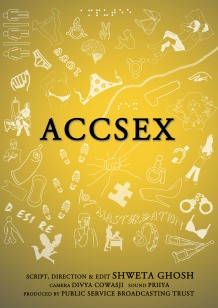Accsex: Disability On and Off Film

Wednesday 13 May 2015, 3.00PM to 5 PM
Speaker(s): Shweta Ghosh
Beautiful. Ugly.
Complete. Incomplete.
Able. Disabled.
Within stifling dichotomies of normal and abnormal, lie millions of women, negotiating with their identities. Accsex explores notions of beauty, the 'ideal body' and sexuality through four storytellers; four women who happen to be persons with disability. Through the lives of Natasha, Sonali, Kanti and Abha, this film brings to fore questions of acceptance, confidence and resistance to the normative. As it turns out, these questions are not too removed from everyday realities of several others, deemed 'imperfect' and 'monstrous' for not fitting in. Accsex traces the journey of the storytellers as they reclaim agency and the right to unapologetic confidence, sexual expression and happiness.
The experience of minority genders with disability largely reflects double discrimination. In the Indian context, identities and stories are further layered by virtue of diversities in caste, class, ethnic and religious backgrounds. The issues of persons with disabilities are often seen through a welfare approach in laws, programmes and policies. A similar charity-tinted lens is employed by educational books and media texts and a basic reading of these shows how the mildest physical and psycho-social disabilities are viewed as 'abnormal'.
Recent times, however, have seen refreshing efforts to handle subjects and stories with the dignity they deserve. It is not uncommon that such material arises out of a well-read and sensitive approach to the production process, often also participation by a person with disability which may inform the content, lend perspective and a certain'everydayness' to so called 'out-of-ordinary' stories.
The UNCRPD, to which India is a signatory, “encourages all organs of the media to portray persons with disabilities in a manner consistent with the purpose of the Convention.” In this light, this presentation encourages media material that is gender sensitive and disabled-friendly and puts forth the benefits of participation of persons with disabilities in media creation processes. It takes off from the author's experience of filming four disabled women in New Delhi for her documentary film Accsex and deliberates upon how the subjectivity of the filmmaker and the participation of the subjects can influence the process and end product. The ultimate goal is to make a case for a rights-based approach to the representation of disability on screen.
Accsex has won a number of awards and been part of several festival selections. It has also been used as a strong advocacy and educational material by activists in the field of disability and gender rights. It has been incorporated into the CREA Disability and Sexuality Rights online institute in 2015.
Shweta Ghosh is a documentary filmmaker and researcher. A silver medalist from the School of Media and Cultural Studies, Tata Institute of Social Sciences (SMCS, TISS), Mumbai, she has explored her interest in disability, cuisine, travel and music through research and film projects.
Shweta's debut documentary Accsex, a film exploring notions of beauty, body, sexuality and disability was awarded Special Mention at the 61st Indian National Film Awards 2014 and has been screened across India and abroad. The film has been appreciated for its rights-based approach to disability and sexuality and has been used widely as advocacy and training material by NGOs and academic institutions.
Shweta has two peer-reviewed publications in Food Studies: An Interdisciplinary Journal (USA) and 'SubVersions' Media and Cultural Studies journal, Mumbai which discuss representational politics on Indian food television. She also has two other documentaries to her credit which explore the social anthropology of food practices.
Location: AEW/104, Alcuin East Wing, University of York, Heslington, York YO10 5DD
Admission: Free
